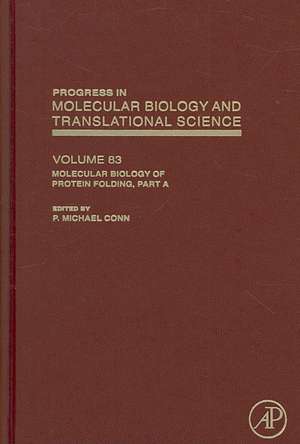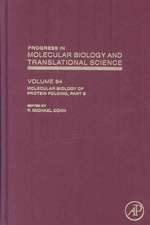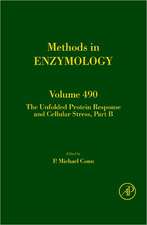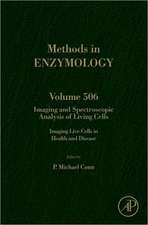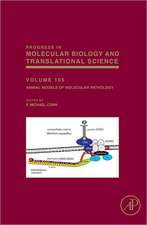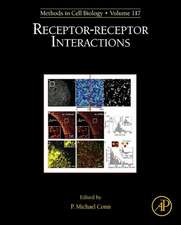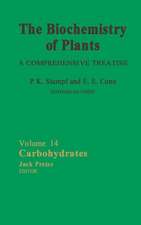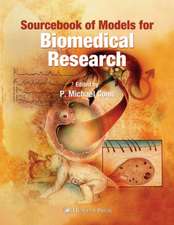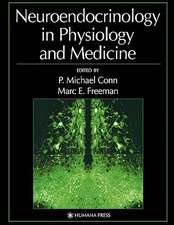Molecular Biology of Protein Folding, Part A: Progress in Molecular Biology and Translational Science, cartea 83
Editat de P. Michael Connen Limba Engleză Hardback – 18 dec 2008
- Follow the new editor-in-chief, P. Michael Conn, as he introduces this first thematic volume in the series – an in-depth aid to researchers who are looking for the best techniques and tools for understanding the complexities of protein folding
- Understand the advantages of protein folding over other therapeutic approaches and see how protein folding plays a critical role in the development of diseases such as Alzheimer’s and diabetes
- Decipher the rules of protein folding through compelling and timely reviews combined with chapters written by international authors in engineering, biochemistry, physics and computer science
Din seria Progress in Molecular Biology and Translational Science
-
 Preț: 587.79 lei
Preț: 587.79 lei - 28%
 Preț: 692.76 lei
Preț: 692.76 lei - 32%
 Preț: 733.30 lei
Preț: 733.30 lei - 31%
 Preț: 741.24 lei
Preț: 741.24 lei - 29%
 Preț: 739.64 lei
Preț: 739.64 lei - 32%
 Preț: 691.44 lei
Preț: 691.44 lei - 32%
 Preț: 612.38 lei
Preț: 612.38 lei - 32%
 Preț: 691.02 lei
Preț: 691.02 lei - 27%
 Preț: 946.70 lei
Preț: 946.70 lei - 28%
 Preț: 640.64 lei
Preț: 640.64 lei - 31%
 Preț: 697.56 lei
Preț: 697.56 lei - 32%
 Preț: 692.27 lei
Preț: 692.27 lei - 32%
 Preț: 612.79 lei
Preț: 612.79 lei - 32%
 Preț: 686.77 lei
Preț: 686.77 lei - 32%
 Preț: 694.46 lei
Preț: 694.46 lei - 32%
 Preț: 690.13 lei
Preț: 690.13 lei - 32%
 Preț: 694.81 lei
Preț: 694.81 lei - 32%
 Preț: 685.90 lei
Preț: 685.90 lei - 31%
 Preț: 700.94 lei
Preț: 700.94 lei - 32%
 Preț: 691.53 lei
Preț: 691.53 lei - 24%
 Preț: 688.43 lei
Preț: 688.43 lei - 31%
 Preț: 698.52 lei
Preț: 698.52 lei - 27%
 Preț: 738.75 lei
Preț: 738.75 lei - 5%
 Preț: 720.92 lei
Preț: 720.92 lei - 29%
 Preț: 720.48 lei
Preț: 720.48 lei - 32%
 Preț: 689.28 lei
Preț: 689.28 lei - 32%
 Preț: 689.28 lei
Preț: 689.28 lei - 32%
 Preț: 691.02 lei
Preț: 691.02 lei - 32%
 Preț: 694.90 lei
Preț: 694.90 lei - 9%
 Preț: 691.87 lei
Preț: 691.87 lei - 5%
 Preț: 719.11 lei
Preț: 719.11 lei - 31%
 Preț: 700.08 lei
Preț: 700.08 lei - 9%
 Preț: 694.39 lei
Preț: 694.39 lei - 32%
 Preț: 697.41 lei
Preț: 697.41 lei - 28%
 Preț: 695.60 lei
Preț: 695.60 lei - 28%
 Preț: 694.28 lei
Preț: 694.28 lei - 27%
 Preț: 702.62 lei
Preț: 702.62 lei - 32%
 Preț: 695.15 lei
Preț: 695.15 lei - 32%
 Preț: 690.42 lei
Preț: 690.42 lei - 32%
 Preț: 696.80 lei
Preț: 696.80 lei - 32%
 Preț: 692.14 lei
Preț: 692.14 lei - 32%
 Preț: 699.66 lei
Preț: 699.66 lei - 32%
 Preț: 698.80 lei
Preț: 698.80 lei - 32%
 Preț: 692.30 lei
Preț: 692.30 lei - 28%
 Preț: 693.69 lei
Preț: 693.69 lei - 32%
 Preț: 698.02 lei
Preț: 698.02 lei - 23%
 Preț: 782.02 lei
Preț: 782.02 lei
Preț: 768.37 lei
Preț vechi: 1192.08 lei
-36% Nou
Puncte Express: 1153
Preț estimativ în valută:
147.05€ • 152.95$ • 121.39£
147.05€ • 152.95$ • 121.39£
Carte tipărită la comandă
Livrare economică 07-21 aprilie
Preluare comenzi: 021 569.72.76
Specificații
ISBN-13: 9780123745941
ISBN-10: 0123745942
Pagini: 288
Dimensiuni: 152 x 229 x 23 mm
Greutate: 0.52 kg
Editura: ELSEVIER SCIENCE
Seria Progress in Molecular Biology and Translational Science
ISBN-10: 0123745942
Pagini: 288
Dimensiuni: 152 x 229 x 23 mm
Greutate: 0.52 kg
Editura: ELSEVIER SCIENCE
Seria Progress in Molecular Biology and Translational Science
Public țintă
Researchers in molecular biology, biochemistry, cell biology, and geneticsCuprins
1. Stability and design of alpha-helical peptides - Andrew Doig
2. Under-wrapped protein folds in disease and epigenetic change - Ariel Fernandez
3. Self-organizing dynamics in protein folding - Bernard S. Gerstman
4. Diffusive models for protein folding - Stephen J Hagen
5. Toward reliable simulations of protein folding, misfolding and aggregation - Ulrich HE Hansmann
6. Single-molecule fluorescence studies of protein folding - Gilad Haran
7. Algorithms for protein folding - Sorin Istrail
8. Use of protein engineering techniques to elucidate protein folding pathways - Sophie Jackson
9. The kinetic stabilities of wild-type and disease-associated mutants of aromatic amino acid hydroxylases. Effect of natural chaperone ligand - Aurora Martinez
10. Chaperone-assisted protein folding in the endoplasmic reticulum - Maurizio Molinari
11. Protein folding over marginal barriers: ensembles, dynamics and stochastics - Victor Munoz
2. Under-wrapped protein folds in disease and epigenetic change - Ariel Fernandez
3. Self-organizing dynamics in protein folding - Bernard S. Gerstman
4. Diffusive models for protein folding - Stephen J Hagen
5. Toward reliable simulations of protein folding, misfolding and aggregation - Ulrich HE Hansmann
6. Single-molecule fluorescence studies of protein folding - Gilad Haran
7. Algorithms for protein folding - Sorin Istrail
8. Use of protein engineering techniques to elucidate protein folding pathways - Sophie Jackson
9. The kinetic stabilities of wild-type and disease-associated mutants of aromatic amino acid hydroxylases. Effect of natural chaperone ligand - Aurora Martinez
10. Chaperone-assisted protein folding in the endoplasmic reticulum - Maurizio Molinari
11. Protein folding over marginal barriers: ensembles, dynamics and stochastics - Victor Munoz
